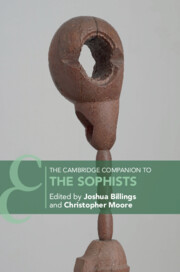Book contents
- The Cambridge Companion to the Sophists
- Other Volumes in the Series of Cambridge Companions
- The Cambridge Companion to the Sophists
- Copyright page
- Contents
- Contributors
- Note on the Text
- Introduction
- Part I Contexts
- Part II Thought
- Part III Receptions
- 12 The Fourth-Century Creative Reception of the Sophists
- 13 Writing the First Sophistic
- 14 The Sophists in the History of Philosophy
- Appendix: The People of the Sophistic Period
- Select Bibliography
- Index
- OTHER VOLUMES IN THE SERIES OF CAMBRIDGE COMPANIONS (continued from page ii)
12 - The Fourth-Century Creative Reception of the Sophists
from Part III - Receptions
Published online by Cambridge University Press: 23 December 2023
- The Cambridge Companion to the Sophists
- Other Volumes in the Series of Cambridge Companions
- The Cambridge Companion to the Sophists
- Copyright page
- Contents
- Contributors
- Note on the Text
- Introduction
- Part I Contexts
- Part II Thought
- Part III Receptions
- 12 The Fourth-Century Creative Reception of the Sophists
- 13 Writing the First Sophistic
- 14 The Sophists in the History of Philosophy
- Appendix: The People of the Sophistic Period
- Select Bibliography
- Index
- OTHER VOLUMES IN THE SERIES OF CAMBRIDGE COMPANIONS (continued from page ii)
Summary
Fourth-century philosophy-aligned authors often present negative views of “sophistry” but more charitable views of those fifth-century individuals they call “Sophist” or include among “the Sophists.” This chapter attends to this often unacknowledged difference, giving evidence for it and offering several explanations. It reviews what fourth-century authors – Isocrates, Alcidamas, Xenophon, Plato, and Aristotle – said about the canonical fifth-century Sophists, Gorgias in particular but also Protagoras, Hippias, Prodicus, and Antiphon. It then assesses what they said about “sophistry,” which they usually presented atemporally, not specifically a phenomenon of a previous generation. Along the way, the chapter discusses how this later generation posited what is now seen as a “Sophistic movement,” the rise of a coherent group of paid teachers of rhetoric and civically valuable skills. Plato, long held responsible for this position, does play an important role, but for reasons connected to his dramatic presentation of Socrates.
- Type
- Chapter
- Information
- The Cambridge Companion to the Sophists , pp. 337 - 369Publisher: Cambridge University PressPrint publication year: 2023

